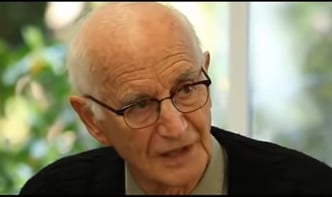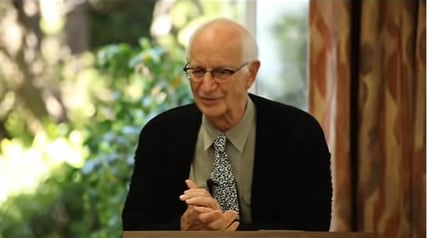by James Hillman, Ph.D.

On the twenty-fifth anniversary of Pacifica Graduate Institute, James Hillman, Ph.D. gave a talk about the ways that Pacifica serves, promotes, and sparks the development of the education of the soul. What follows is a transcription of his talk.
The genius of this place, the actual physical place, that keeps the place alive and is tended by the president, has been a work of twenty-five years. The attention to the place, to the spirit of it, the soul of it, the physical actuality of it, is quite extraordinary. It’s part of the personal reason why I’m speaking to you today about Pacifica, in three parts.
First, the people. This is a body of people here that I’ve known since the 1970s and 80s. That’s a good span of life, and it creates an atmosphere of collegiality that’s very important. I’m among friends when I come here, and like-minded colleagues who are people of purpose. There are a lot of people who work, who have jobs, work toward retirement, but the people who work at Pacifica all seem to be people of purpose. I find that here there’s that commonality of individuals who have something do. There are difference among faculty and staff in their pursuits, they are not always in agreement on the way to do things. But they are agreed in dedication. The faculty and the staff and the students join a fellowship. You learn as much from that fellowship as you do from the reading, faculty, classes, and so on. The students who come to Pacifica often have unusual experiences behind them and interesting places where they are engaged outside of Pacifica. So there is an enormous amount of learning in the cohorts at Pacifica. That way of learning brings a kind of experience, and dedication to a purposeful life. So that’s the first reason I want to talk with you about Pacifica: the people.
The second reason for my telling you about Pacifica, is the genius loci, the genius of the place, the spirit of the location, the attention to the place, to the spirit of it, the soul of it, the physical actuality of it. This includes the staff that maintain the same kind of spirit of the place. And that’s an unusual thing. When I come here I feel a joy coming out of the actuality of the place.

The third reason is this is a place of learning. Learning means a lot to me. Now you can say that all schools are concerned with learning, but there are different kinds of learning. And this place concerns itself with the kind of learning that touches the soul. It’s relevant to why we’re alive. So reading, writing, and thinking. Thinking is something that’s gotten left behind in a lot of places. But here they still are concerned with thinking about the things you read and the things you write. The school itself is working at the question of education. What is a psychological education? The school itself is constantly trying to formulate at answer to that. It certainly doesn’t mean reading psychology books, certainly not that. How do we develop people who have a psychological sensitivity? This idea of psychological intelligence is already being imagined by Howard Gardner at Harvard University, where he has divided up the notion of intelligence in to varieties of intelligence, one of which is the intelligence required for working with people. One of the things here that seems to me important, and what I come for and learn from, is how that question of psychological intelligence is developed by the members of the faculty in their own individual way.
The question is, What is the education of the soul? The soul doesn’t just come into the world, it goes through a long process of education. How is your soul imagined into its life? Pacifica seems to always be working on, discussing, trying to discover what soul is. Socrates was working on this question from Day 1. And the student, should you come to Pacifica, become part of this endeavor. The student is part of the endeavor of discovering, answering the question, What is an education of the psyche?



